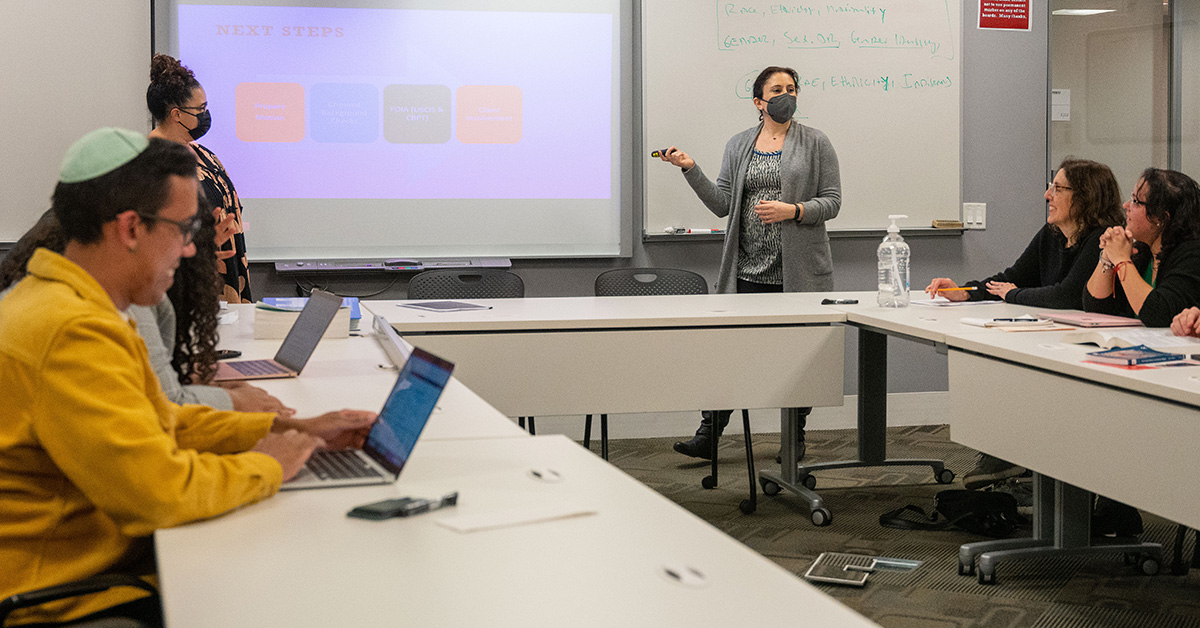New litigation and policy project ensure immigrants are not left behind in efforts to dismantle the carceral state

“Oftentimes, immigrants are left out of marijuana advocacy conversation.” – Joel Perez-Romano, INRC student
“Advocates need to be aware of how immigration law hyper-criminalizes controlled substances.” – Sandra Argueta, INRC student
“As thoughtful advocates, it is important that we include non-citizens and highlight the consequence of state legalization of marijuana.” – Yassine Bousfiha, INRC student
Evening students in the Immigrant and Non-Citizen Rights Clinic have teamed up with the Immigrant Defense Project (IDP) to launch a new initiative encouraging the adoption of inclusive marijuana expungement and legalization around the country. Their goal? Create policy papers and litigate individual cases to change the conversation and influence national policy formation.
The inclusive model demands states legalizing marijuana also work to repair the harms of state marijuana prohibition on immigrant communities. Current immigration law harshly punishes people with marijuana convictions with exile and ineligibility for immigration status. Most legalization efforts, even in self-proclaimed “progressive” states, have largely failed to address these immigration harms.
Despite increasing recognition of the ways in which the War on Drugs has targeted communities of color, there has been insufficient focus on how Black and Latinx migrants have been uniquely harmed by this global war. Decarceration efforts, prison condition reforms, and bail funds leave the unique concerns faced by immigrants often invisible and at times are exacerbated by such efforts.
While many states’ legalization efforts include expungement and economic opportunities for people of color, they fail to treat marijuana justice as an immigrant justice issue. While some states have passed wholesale expungement provisions that clear records of prior minor marijuana convictions, these expungements have almost no ameliorative impact on immigrants facing deportation. Under current immigration law, state expungement and vacatur are only recognized in narrow circumstances. IDP worked for many years in coalition with Drug Policy Alliance and others to ensure New York included a mechanism in the Marihuana Regulation and Taxation Act (MRTA) that permits immigrants to seek vacatur of marijuana offenses that would be recognized by immigration as valid. This 2021 law provides a mechanism through which thousands of immigrants can petition New York courts for record clearance that saves them from deportation and other draconian consequences for marijuana offenses.
INRC students are using the new mechanisms created by the MRTA in requests for record clearance before the criminal court for individual clients. This paves the way for other immigrants and ensures this law is interpreted faithfully and can be used by others. Students are also gathering the perspectives of directly impacted individuals who can speak to the difference record clearing makes for them, their families, and their communities.
INRC is also creating policy materials to support advocates in other states to ensure that marijuana legalization and expungement are recognized as a social, economic, racial, and immigrant justice issue nationwide. INRC students are uniquely contributing to the national conversation by lifting up the needs of immigrants to ensure they are not left behind in the dismantling of the carceral state. Stay tuned for next time when you can learn about the cases INRC students are working on and their advocacy efforts!
This new initiative is being supervised by Professors Talia Peleg and Marie Mark.
